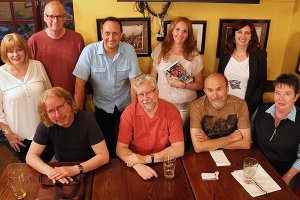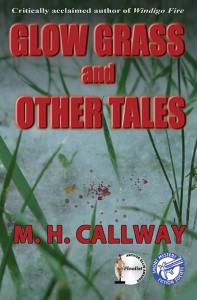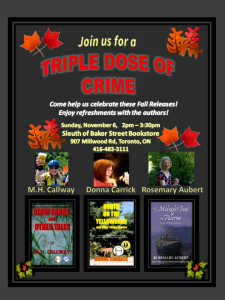
I first met June in cyberspace. She’s a great supporter of fellow crime writers, their books, events and websites via her blog, Murder in Common. We finally met in “meat space” at Toronto’s latest Noir at the Bar event organized by fellow crime writers, Tanis Mallow and Rob Brunet. A true pleasure to chat and to listen to her work!
Fans of crime fiction will enjoy June’s book reviews and recommendations. Read on!
Welcome, June! Do tell us how you started Murder in Common.
Thank you Madeleine for inviting me to your blog. It’s great getting to know new authors and I’ve been a fan of your work since you read Windigo Fire at Noir at the Bar Toronto.
Crime fiction (CriFi) is the main theme of Murder in Common. Occasionally you will find opinion pieces on writing and the terrors and joys of expressing yourself with the written word.
I had to look-up the date of the inaugural post, it was October 7, 2013, and was titled “The Art of Reading.” It took a while for me to find my online voice for this blog and for now, I’m happy with it.
Generally my posts are published weekly from mid-September to the end of June. The summer hiatus provides reading time and a brain refresh. I can however, be coerced to post by a debut author’s book launch.
Why crime fiction?
Reading crime fiction is something I’ve done from a very young age. Phyllis A. Whitney, Mary Roberts Rinehart and Patricia Highsmith are the authors I remember most. Of course all Nancy Drew and Hardy Boys books were devoured.
Tell us about your followers.
What a pleasure to discover that my blog has reached readers from around the world. No surprise , of course, that CriFi is of interest. Geographically, the furthest readers from Canada are in Australia. The countries of readers that were a surprise: South Korea, Finland, Romania and Russia.
When someone asks for more information about a book, I know that my post has captured enough attention to warrant the question. That’s really how I write most of my posts, to initiate conversation. The dialogue with my readers is really the best part of writing online.
An author once referred to Murder in Common as a curated site. That took me aback and had me thinking about what I was putting out there. The truth is she is correct, and the basis for curation is opinion. I am opinionated about the books I’ve read. However, I don’t view my site as a review site exactly. I refer to the books I post about as “Recommended Reading.”
While my preference is Noir, there are lighter crime books that I have enjoyed and therefore I write about them. All in all, those books that have captured me for various reasons: characters, plot, deviousness, imagination and that certain turn of phrase that makes me smile. Or horrifies me.
I’m also quite pleased when my posts about writing garner feedback. My contribution in this area seems to be appreciated which is both rewarding and informing.
Which blog is your personal favorite?
My personal favourite is “Come Home to Giles Blunt” where I talk about leaving the mainstream of highly promoted USA best sellers, and discovering the writers producing wonderful work right under our noses. (Hear! Hear! MHC)
Almost three years later I had the privilege of reading my flash fiction at Noir at the Bar Toronto the same night as Blunt. The group picture was the bonus of reading with other Canadian talent and it was a terrific experience.
Authors: Back L-R: June, Peter McGarvey, Rob Brunet, Dee Wilson, Tanis Mallow Front L-R: Giles Blunt, John McFetridge, Dietrich Kalties, Rosemary McCracken
How can readers follow your blog?
Murder in Common has a Follow button which most WordPress users take advantage of. Otherwise you can sign-up via email subscription. All constructive feedback is greatly appreciated.
Thank you, June. It was a pleasure to meet in Cyber Café and I look forward to reading your own crime fiction soon!


